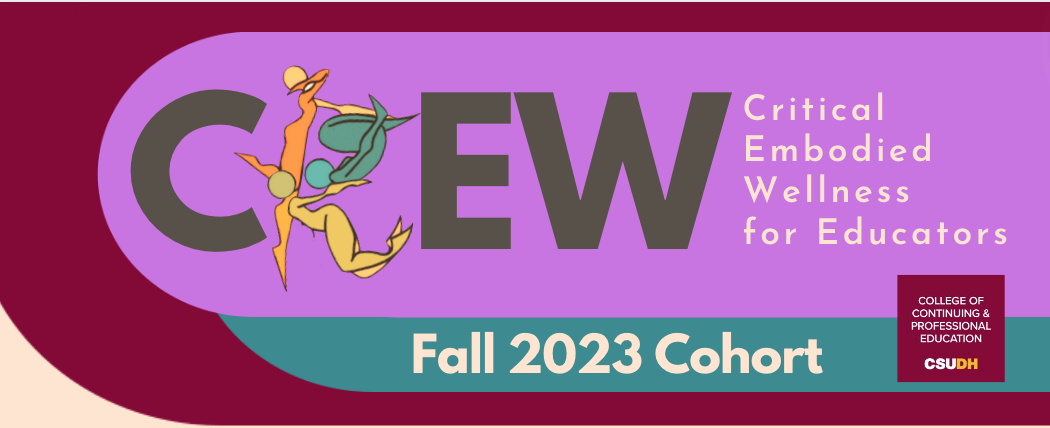Critical Embodied Wellness (CrEW) for Educators
Latest News

Course Objectives
Participants will cultivate Critical Embodied Wellness…
- Theory: Name the strengths, challenges, contradictions, and possibilities of personal and collective care in their particular school contexts, based on interdisciplinary research on trauma-informed care and healing justice.
- Practices: Apply embodied strategies to clarify values and purpose, strengthen relationships and collaboration, and deepen classroom instruction
- Community: Utilizing a cohort model, each session will provide ongoing opportunities for deep connection through the use of small wellness inquiry groups, as well as differentiated choices for integration that include guest speakers, online discussion forums, and check-in sessions with course facilitators.
- Transformation: Through the integration of theory, practice, and community, participants will develop a vast toolkit for change and an understanding that we need to transform both the self and systems in order to build more sustainable containers of care in education.
Course Structure
Through a cohort model, participants will engage in a 6-part series of orientation and monthly class meetings following a framework of 4 I's:
- Internal foundations: Focusing on the inner work of self care, participants will learn and practice embodied strategies for sustainability and wellness, reflecting on how their work habits and coping strategies have been shaped by micro- and macro-contexts, to enhance their capacity to care for themselves and their respective communities.
- Interpersonal relationships: Drawing from restorative justice frameworks, participants will learn about strategies for healthy communication, generative conflict, and embodied boundaries within peer-peer and teacher-student relationships.
- Instructional applications: Participants will learn about trauma and healing-informed strategies for the classroom, developing radical emotional literacy practices to serve the holistic needs of diverse students.
- Institutional interventions: Integrating learning from the first three parts with scholarship on trauma-informed leadership and healing justice, participants will reflect on structural interventions to provide the necessary conditions for educators to care for themselves, colleagues, students, and communities.
Through exploring and practicing these frameworks at an embodied level, participants will learn tangible strategies to cultivate the pillars of humanizing pedagogy — a knowledge and love of self, self-determination, and solidarity (Camangian & Cariaga, 2021) — for themselves, students and communities.
Course Schedule
CrEW for Educators Fall 2023 will offer two cohorts: one virtual and one hybrid. For each cohort, all course meetings will be on Saturdays, from 9am-1pm.
Virtual Cohort: All meetings on Zoom |
August 12 (Orientation) August 26 September 23 October 14 November 18 December 9 |
| Hybrid Cohort: In-person and Zoom |
| Date | Modality |
August 5 (Orientation) August 19 September 23 | In-person on CSUDH campus |
October 14 November 18 | On Zoom |
| December 9 | In-person on CSUDH campus |
Assignments
To earn 3 university units, participants will be expected to attend all meetings and complete the following assignments for each cohort:
- Asynchronous assignments in between class meetings
- Text Discussion Boards: Participants will be given a variety of texts (i.e. articles, podcasts, etc) to reflect on relevant themes from the course.
- Wellness Inquiry Group (WIG) Reflection: Participants will be organized into small affinity groups of educators to check in regularly about their commitments and embodied practice.
- Self-Reflection on Critical Embodied Wellness
- Reflect and present to class about progress towards wellness goals throughout the course, major learnings, and possible applications in the field of education moving forward